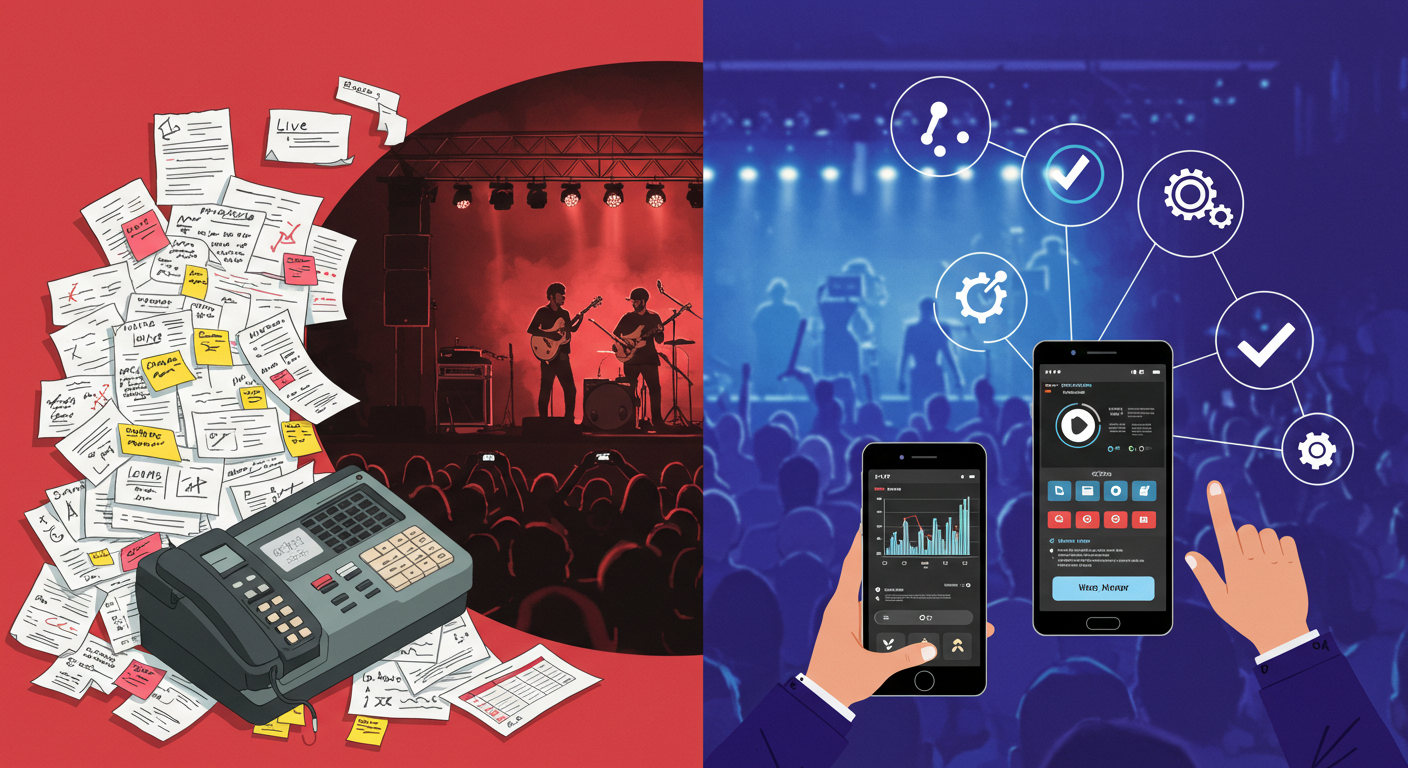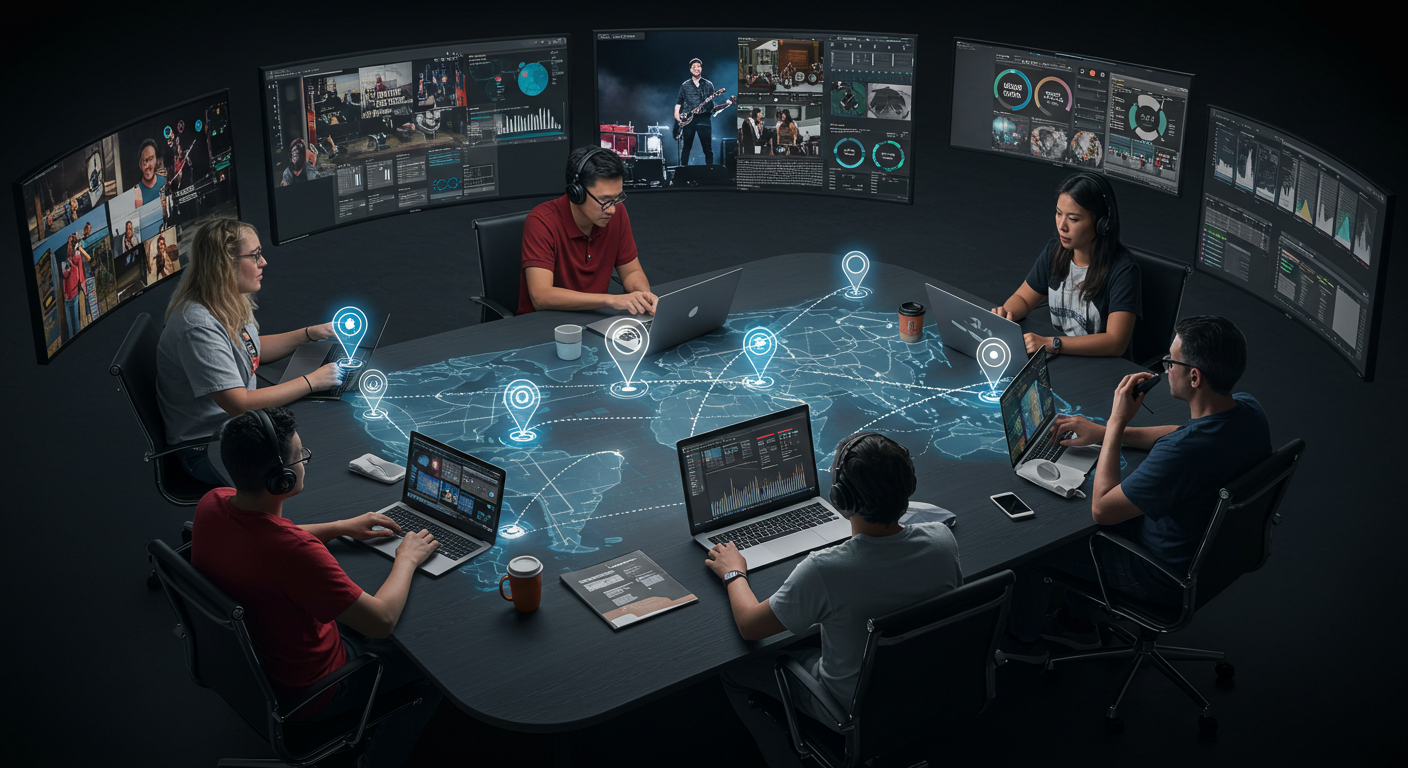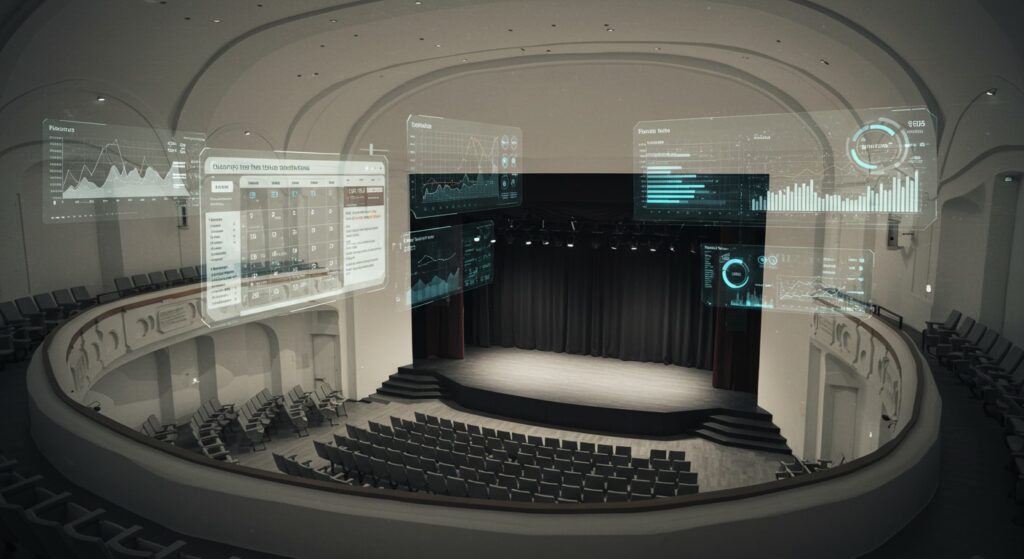
The Future of Concert Event Management: Trends to Watch
Concert event management is evolving fast, and for anyone still juggling spreadsheets and scattered emails, the writing’s on the wall. In just the last year, the live music industry has seen a surge in demand for smarter, faster, more connected workflows. Along with focusing on the fan experience, venues are pushing for the integration of better tech. Add in ongoing pressure to do more with less, and it’s clear that running shows the old way is inefficient and risky.
Emerging tech, especially concert planning software built with industry-first features, is unlocking a whole new level of agility. From AI-powered forecasting to mobile collaboration tools that keep your entire team in sync, the next wave of innovation is here. If you book, promote, or manage live shows for a living, staying ahead of these trends is your edge.
Concert Event Management Is Entering a New Era
The days of whiteboards, spreadsheets, and a million open tabs are numbered. Today’s concert event management is all about centralizing calendars, contracts, communications, and cash flow in one streamlined ecosystem. Let’s break down the key forces rewriting the rulebook:
Tech-Driven Efficiency Is Now the Baseline
Promoters and venues are done tolerating systems that make their lives harder. From instant availability sharing to real-time financial updates, event teams now expect tools that anticipate their needs, not ones that add extra steps. Platforms purpose-built for concert workflows are killing the lag time between booking, offer, and settlement. If your software isn’t speeding you up, it’s slowing you down.
This level of operational speed isn’t just for the big dogs anymore. Independent venues and boutique agencies are tapping into the same tools that used to be locked behind enterprise paywalls. And the results they’re seeing are fewer dropped balls, faster decisions, and more shows on the books.
Data Integration Is Becoming Non-Negotiable
Disconnected systems mean duplicate work, missed info, and way too many moments of confusion. Integrated data across ticketing platforms, financials, artist history, and more is now essential for managing multiple shows across teams. It’s about having the info in the right place, at the right time, without digging through your inbox or folders on your desktop.
By syncing these systems under one roof, teams are getting better visibility and faster access to the data that drives decisions. Whether you’re pricing a deal or tracking artist ROI, you need that info live, not three days (and three texts) later.
Mobile Access Is No Longer Optional
In this industry, half your job happens outside the office, whether on the road, backstage, or deep in the crowd. Mobile functionality is the expectation. If your concert planning software can’t handle offer edits, calendar updates, or quick settlements from a phone, it’s already behind the curve.
Modern concert pros need to manage events on the go without sacrificing clarity or control. Whether you’re settling a show at midnight or locking in a hold between soundcheck and doors, mobile-first tools are the new lifeline for keeping everything moving.

Automation and AI Are Reshaping How Shows Get Booked
The live event industry has always moved fast, but now, automation and AI are cranking up the speed. What used to take hours of admin time or back-and-forth is getting handled in seconds, with way less room for error. From building offers to tracking payments, automation is becoming the backbone of modern concert event management. AI is stepping in to help teams predict, optimize, and act with more confidence.
Here’s how this shift is playing out behind the scenes:
Smart Forecasting Reduces Risk in Deal-Making
Making a solid offer used to involve a lot of guesswork. But now, AI-powered forecasting tools can analyze box office data, ticket sales patterns, and local demand to help you decide whether a show is worth the gamble. That kind of insight is a game-changer for promoters trying to weigh risk vs. reward in real time.
Because this data is pulled from real historical events (not hypotheticals), you’re making decisions backed by actual revenue trends. The first step is forecasting your business’s growth, and maybe you can predict the next top hit using AI technology.
AI Tools Are Speeding Up Offer Generation
Creating offers is one of those “high stakes, low margin for error” tasks, and it’s often where things bottleneck. AI is now helping to automate this process by pre-filling deal terms, flagging anomalies, and suggesting optimized splits based on past performance. What used to take hours between agents, promoters, and venues can now be knocked out in minutes.
For teams juggling multiple offers a week (or a day), that time saved directly translates into more booked shows and fewer missed opportunities.
Automated Settlements Are the Future of Financial Clarity
Settlement days used to be a mess with manual calculations, cross-checking numbers, and hoping nothing got missed. But automated settlement tools are bringing clarity and consistency to a process that used to feel like a fire drill. Now, you can pull all the data from the original offer, track actuals, and generate a clean, audit-proof settlement without lifting a calculator.
When you add in the ability to handle co-pro deals, partner splits, and toggled revenue streams, you’re settling faster and doing it smarter.
The Rise of Concert Planning Software That Thinks Like a Promoter
Modern concert planning software isn’t just a scheduling tool anymore. It’s evolving into a command center that mirrors how live event professionals actually work. From booking logistics to team communication and financial tracking, today’s platforms are adapting to the real-world challenges promoters, venues, and agencies face every day.
Here’s what’s setting the new generation of software apart:
From Spreadsheets to Smart Systems
Many live event teams are still stuck toggling between spreadsheets, emails, and disconnected apps. It’s inefficient, error-prone, and nearly impossible to scale. Forward-thinking platforms are eliminating that fragmentation by offering one centralized system that handles everything from calendar holds and contracts to payments and settlements under one roof.
By consolidating workflows, teams can spend less time searching for files and more time booking shows. The software actively organizes and surfaces what matters most.
Centralized Platforms for Distributed Teams
Remote work and mobile collaboration aren’t going anywhere. Whether you’re in the office, on tour, or working across time zones, having a centralized platform that keeps everyone aligned is critical. These systems offer a shared source of truth for every stakeholder involved, from talent buyers and production managers to finance and marketing.
The result? Fewer miscommunications, smoother execution, and a team that stays in sync, no matter where they’re working from.
How Custom Permissions Are Protecting Your Ops
Concerts involve a wide range of roles. Some need access to financials, while others just need run-of-show details. That’s where role-based permissions come in. Leading concert planning software gives administrators the ability to tailor access levels by user type, helping to maintain security and reduce confusion.
This kind of granular control safeguards sensitive data and ensures that each team member sees exactly what they need to do their job.
Collaboration and Co-Pro Models Are Gaining Ground
As the live music business becomes more complex, collaboration is a necessity. Whether it’s venues and promoters working together or multiple partners sharing show responsibilities, today’s concert event management demands tools built for shared control and clear communication.
Platforms that facilitate collaboration without sacrificing visibility or accountability are quickly becoming industry standards.
Why Shared Calendars and Offers Are Becoming Industry Standard
Coordinating holds, offers, and availabilities across multiple teams used to be a manual mess. Now, shared calendars are streamlining the process. Promoters can drop holds directly into a venue’s calendar, agents can view real-time avails, and both sides can stay updated without sending a single email.
This live sync between teams reduces delays, accelerates decision-making, and ensures that everyone is working from the same information at the same time.
Co-Pro Settlement Features: A Must-Have for Multi-Partner Shows
As co-promotions become more common, managing profit-and-loss splits has grown more complicated. The best tools now support partner-specific deal terms, revenue toggles, and customized settlement views. That means you can split bar revenue but keep merch off the table or automatically factor in per-ticket bonuses.
These tools speed up the reconciliation process and help maintain trust between partners by ensuring transparent and accurate earnings reporting.

Integrated Communications Are the New Superpower
Email threads and Slack messages can only go so far. Built-in communications within your concert planning software allow your team to log notes, assign tasks, and track updates all within the event record itself. When conversations live alongside the data they reference, nothing gets lost in translation.
Whether it’s confirming ticket scaling or clarifying a budget line, having one place to manage both info and dialogue is becoming essential to modern operations.
Data-Driven Decisions Are Finally Reaching the Indie Level
For years, only major players had access to the kind of data that could truly guide strategy. That’s no longer the case. Concert planning platforms are now empowering independent venues and promoters with insights once reserved for national agencies and corporate groups.
Historical Box Office Intel Is Leveling the Playing Field
Choosing the right act for your room isn’t just about gut instinct anymore. Access to historical box office data by genre, region, or specific artist helps promoters gauge how well an act is likely to perform before committing to a deal.
This shift puts data in the hands of those who need it most, helping them mitigate risk, price smarter, and avoid costly misfires.
Real-Time Metrics Are Empowering Faster, Smarter Moves
Whether you’re tracking ticket sales, forecasting revenue, or monitoring expenses, having real-time metrics allows you to adjust in the moment, not after the fact. With dashboards updating live, teams can spot issues before they become problems. Likewise, they can capitalize on momentum when things are going well.
From announcing earlier to scaling back costs, this kind of visibility allows for more agile and confident decision-making across the board.
Custom Reporting Is Driving Financial Strategy, Not Just Admin
Music pros no longer hand off financial reports to the accountant to deal with. They need visibility into the whole picture. With custom reporting tools, operators can break down revenue streams by event type, artist, or deal structure. They can compare past performance, project future cash flow, and uncover what’s really driving their margins.
These strategic insights allow teams to focus on what’s working, cut what isn’t, and plan with precision.
What the Future Looks Like for Independent Promoters and Venues
The future of concert event management is being built by promoters, venue managers, and operators who need better ways to do their jobs. As the tools get smarter, more integrated, and more user-friendly, independent teams are set to benefit the most.
Here’s what the road ahead looks like for the ones doing the work:
Hybrid and Niche Events Are Sticking Around
Virtual components, boutique festivals, and genre-focused shows aren’t going anywhere. These formats offer flexibility, targeted audiences, and creative programming options, especially for mid-sized and independent venues looking to stand out.
Tools that support hybrid ticketing models and non-traditional event structures will be increasingly important in adapting to this growing demand.
Tech That Grows with You, Not Against You
One of the biggest changes on the horizon is software that scales with your business. Whether you’re a single-room venue today or expanding into a multi-city network next year, modern platforms are being built to grow with your needs, without forcing a total system overhaul.
That means more long-term stability, less onboarding fatigue, and better continuity as your team and workload evolve.
Streamlined Systems = Bigger Margins, Fewer Fires
At the end of the day, every promoter and venue wants the same thing: fewer headaches and more profit. Streamlined systems reduce redundancy, cut down on errors, and free up bandwidth to focus on booking better shows, not chasing down files or fixing math mistakes.
As margins stay tight and competition stays fierce, operational efficiency may be one of the last true differentiators.
Stay Ahead or Get Left Behind: Time to Upgrade
Concert event management is shifting rapidly, and the tools you use can either push you forward or hold you back. From automated settlements and AI forecasting to centralized collaboration and real-time data, the trends we’re seeing are signals of where the industry is headed.At Prism, we’ve built our platform specifically for the people doing the real work of booking, promoting, and producing live shows. We know the pressure, the pace, and the margins. That’s why everything we build, whether it’s co-pro deal management or artist performance insights, is designed to give you clarity, control, and more time to grow your business. Get started today and see what next-level concert planning actually looks like.



